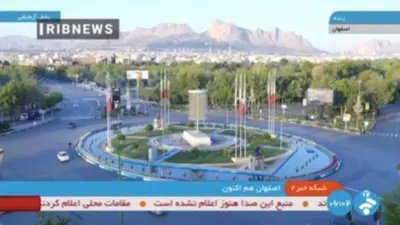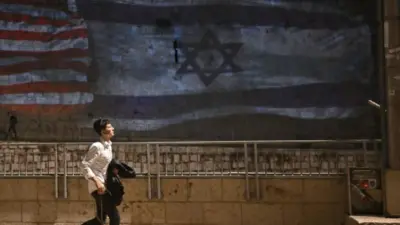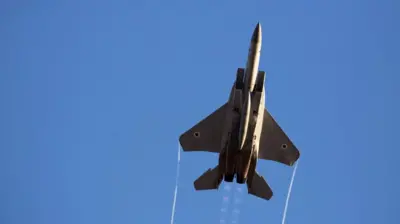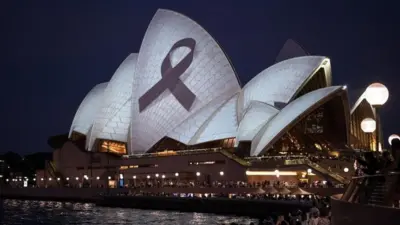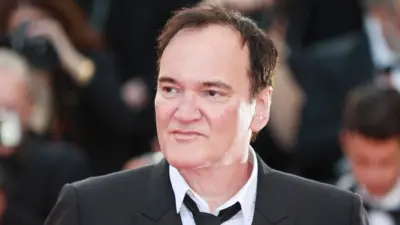We've updated our Privacy and Cookies Policy
We've made some important changes to our Privacy and Cookies Policy and we want you to know what this means for you and your data.
Babyn Yar: Synagogue opens at Nazi massacre site in Ukraine
- By Laurence Peter
- BBC News
Image source, AFP
Ukrainian officials have opened a synagogue at Babyn Yar near Kyiv - a place where the Nazis murdered nearly 34,000 Jews in World War Two.
Babyn Yar was a ravine where Jews from Kyiv were lined up and shot dead by the invading Germans over two days in 1941.
The death toll rose above 100,000 over the next two years as Hitler's Nazi SS murdered more Jews there, along with Roma (Gypsies) and Soviet prisoners.
The synagogue is part of a new memorial being developed in the area.
Ukraine's Chief Rabbi Moshe Reuven Azman spoke at the synagogue's inauguration, which was attended by Prime Minister Denys Shmygal.
Image source, Babyn Yar Holocaust Memorial Center
The synagogue's ceiling has a painted map of the night sky, with stars positioned as they were on 29-30 September 1941, when more than half of Kyiv's remaining Jews were massacred.
Image source, Babyn Yar Holocaust Memorial Center
Warning: You may find some of the images below upsetting
The Nazis had told the Jews to assemble with extra clothes, implying that they would be sent to a labour camp.
Earlier, about 100,000 Jews had managed to flee the city, as the Nazis advanced.
The atrocity at Babyn Yar - also known as Babi Yar - was one of the largest massacres of Jews on Soviet soil during the war.
About six million Jews died in the Holocaust, many of them in death camps in Nazi-occupied Poland.
The opening of the synagogue on Friday coincided with Ukraine's first official Day of Remembrance for Ukrainians who saved Jews during the war.
Israel honours 2,659 Ukrainians as Righteous Among the Nations for having saved Jews from Adolf Hitler's extermination campaign.
However, there were also Ukrainians who betrayed Jews to the SS, including ones who assisted in mass murder.
To cover up the atrocity later in the war the retreating Germans bulldozed the ravine and burned the bodies in huge pyres.
Image source, Alamy
Image source, Alamy
'New worlds unfold'
The synagogue's Swiss architect, Manuel Herz, designed it to open and close like a book, with a manual mechanism that worshippers will operate. It was inspired by pop-up books, but also reflects the holy text of synagogue services.
"From a flat object of a book, when we open it, new worlds unfold," the manuelherz.com website says.
The 11m-high (36ft) building has a metal frame and is made of Ukrainian oak more than a century old, to reconnect with the old Jewish traditions of the area. The painted constellations on the ceiling also echo the artwork of synagogues destroyed by the Nazis.
Image source, AFP
For decades, during the Soviet era, there was little to mark the massacre site. A simple obelisk referred to "Soviet" victims without mentioning the Jews, who were the main victims.
The poem Babi Yar by Soviet-era poet Yevgeny Yevtushenko deplored the Nazi atrocity but also anti-Semitism in the USSR, with the words: "No monument stands over Babi Yar. A drop sheer as a crude gravestone. I am afraid. Today I am as old in years as all the Jewish people."
Near the new synagogue stands a large Menorah monument, erected in the 1990s when independent Ukraine decided to commemorate the Jewish victims.
Image source, Getty Images
Artistic dispute
There is controversy over the project for developing the Babyn Yar memorial, with some Ukrainian artists and politicians criticising its Russian artistic director, Ilya Khrzhanovsky.
Some accuse the film director of trying to impose a Russian vision on a highly sensitive project. Russia's annexation of Ukraine's Crimea peninsula in 2014 and the Donbas conflict have fuelled a Ukraine-Russia propaganda war including some distortions of history.
BBC Monitoring reports that a draft concept spoke of giving Babyn Yar visitors a "unique emotional experience" based on an "ethical dilemma". It would use virtual reality to put visitors in the shoes of victims and perpetrators - though Khrzhanovsky insisted that it was still a work in progress.
"I can create a unique and important story both for Ukraine and the world," he said.
Top Stories
Features & Analysis
Most read
Content is not available
